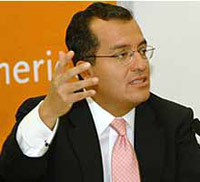 |
 |
 |
 News Around the Republic of Mexico | May 2005 News Around the Republic of Mexico | May 2005  
Ugalde Promises Clean '06 Elections
 David Gaddis Smith - Union-Tribune David Gaddis Smith - Union-Tribune


| | Luis Carlos Ugalde of Mexico's Federal Electoral Institute. |
Three years before he was named president of Mexico's Federal Electoral Institute in 2000, Luis Carlos Ugalde wrote a book in which he listed five steps that Mexico's Congress needed to take to become an effective institution.

So far, only one of them has been taken, said Ugalde, who was the keynote speaker Wednesday at the 25th anniversary celebration for the Center for U.S.-Mexican Studies at the University of California San Diego.

While Mexico has become an electoral democracy, he said, it has a ways to go to provide the jobs and security Mexicans deserve.

"I guarantee that in 2006 that we will have clean elections. But Mexican citizens are not only demanding clean elections but effective government," said Ugalde, who is in charge of next year's presidential elections.

"The problem we have in Mexico today is that Mexicans perceive that electoral democracy, however nice, does not achieve the goals that Mexicans want."

However, Ugalde said significant changes have occurred in Mexico since he was a student in the center's first summer seminar in 1989.

Mexico's first opposition governor in 60 years, Ernesto Ruffo, was voted into office that summer in a historic Baja California gubernatorial election that Ugalde said he observed with the center's founding director, Wayne Cornelius.

Cornelius, now director for UCSD's Center for Comparative Immigration Studies, was honored at Wednesday's gala, and Ruffo was in attendance.

Ugalde's institute, founded in 1990, oversaw elections in 1997 in which the Institutional Revolutionary Party, or PRI, lost its congressional majority for the first time. Three years later, the PRI lost the presidency to Vicente Fox of the National Action Party.

Ugalde said 64 percent of local governments are now run by a party other than PRI.

He noted that Mexico's electoral system has even become the model for other countries, hosting a workshop last year for Iraqis who helped organize their country's Jan. 30 election.

But most of the five changes listed in his book, "The Mexican Congress: Old Player, New Power," have not come about, he said.

Mexico needs to allow the consecutive re-election of legislators in order for Congress to be effective. This has not happened.

Two separate recommendations on changing budgetary matters have not been enacted.

Regulation of investigative committees has not occurred as he outlined.

Mexican legislators need much more money to have an effective staff. This is the only step on which there has been progress, Ugalde said.

At the ceremony, Ugalde speculated on what people might be discussing during the center's 50th anniversary, in 2030.

He said they might be discussing the effects and costs of electronic voting, the effects of a new law allowing Mexicans to vote abroad and perhaps the experience of the first 20 years of parliamentary government in Mexico.

Some experts think Mexico would do better with a parliamentary system of government rather than a presidential system. At a roundtable discussion preceding Wednesday's gala dinner, Mexican politician Porfirio Muñoz Ledo said Latin America's adoption of the U.S. presidential system has not worked well for many countries in the region.

There was perhaps some wry humor in Ugalde's remark about a 2030 law allowing Mexicans to vote abroad, because Mexico has been wrestling with that issue for years.

Ugalde said in an interview Thursday that Mexico's Congress has taken so long to come up with a plan for the 2006 election, the only workable option it has left is to allow Mexicans in the United States to vote by mail. He said the 4 million Mexicans in the United States holding Mexican voter cards would be allowed to vote. | 
 | |
 |



